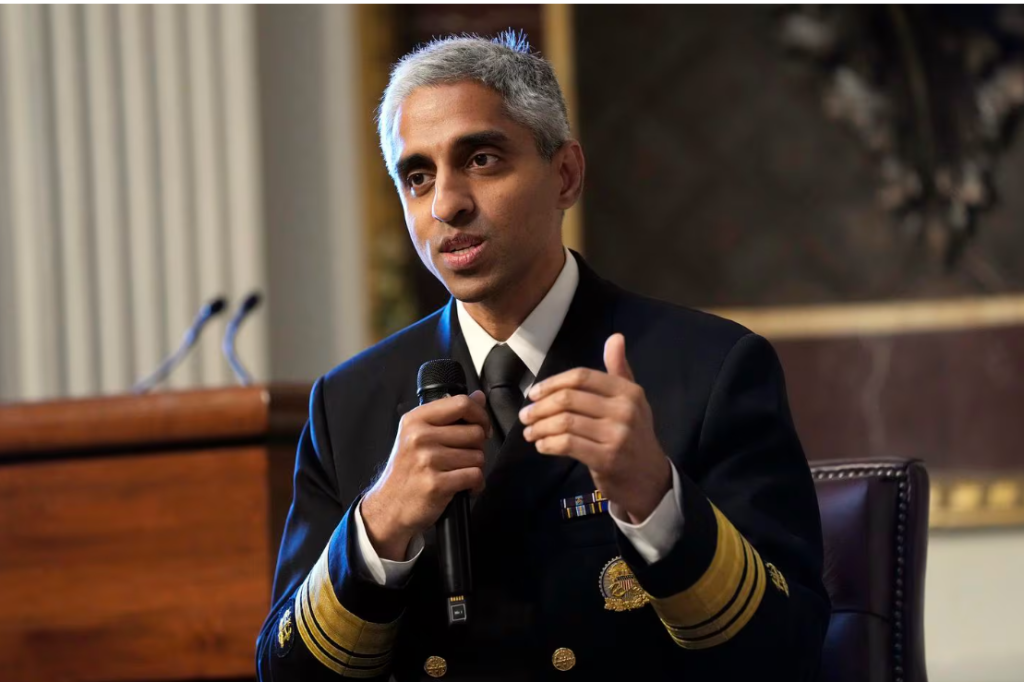【中美创新时报2024 年 6 月 18 日编译讯】(记者温友平编译)美国卫生局局长维韦克·H·穆尔蒂(Vivek H. Murthy )周一(17日)呼吁在社交媒体上贴上烟草式的警告标签,提醒用户这些平台可能会损害青少年及儿童的心理健康,他对 Facebook、Instagram 和 TikTok 等在线服务的影响发出了进一步的警告。《华盛顿邮报》记者Cristiano Lima-Strong 和 Aaron Gregg对此作了下述报道。
穆尔蒂在《纽约时报》的一篇评论文章中写道,敦促国会颁布立法,要求社交媒体平台包括卫生局局长的警告,以“定期提醒父母和青少年,社交媒体尚未被证明是安全的。”
穆尔蒂引用了 2019 年的一项研究,该研究发现,每天在社交媒体上花费超过三个小时的青少年患抑郁症和焦虑症的风险增加了一倍。他说,统计数据显示,青少年每天平均使用社交媒体 4.8 小时。
穆尔蒂说,烟草和酒精产品上的警告标签已被证明可以改变人们的行为。
卫生局长呼吁采取行动之际,监管机构和立法者越来越多地审查社交媒体使用与儿童心理健康之间的联系,引发了一波扩大对互联网儿童保护的提案。立法者将科技对青少年的影响比作大烟草公司的影响,并敦促迅速采取行动来抵消他们所谓的青少年心理健康危机的驱动力。
然而,尽管两党强烈抗议,但科学界仍在就社交媒体的使用可能在多大程度上导致儿童和青少年的心理健康问题展开激烈争论。研究人员和政府官员一直在推动增加联邦资金来研究这一主题,他们批评科技公司没有向公众提供更多有关此事的内部数据。
但穆尔蒂和其他政府官员认为,无论研究是否存在差距,都有足够多的证据表明社交媒体可能不安全。
“我在医学院学到的最重要的一课是,在紧急情况下,你没有时间等待完美的信息,”他写道。穆尔蒂说,标签上会写着“社交媒体与青少年的严重心理健康危害有关。”
十多个州通过了旨在扩大儿童使用社交媒体的防护措施的法律,其中一些州完全禁止儿童访问这些网站,并要求青少年使用社交媒体时得到父母的批准。其他州则效仿了英国具有里程碑意义的法规,要求科技公司在开发产品时考虑“儿童的最大利益”。
州法律受到科技行业团体的质疑,他们认为这些法律违宪,侵犯了用户的言论自由权。此后,一些州的法律已被法院叫停。
在国会山,立法者正试图推进一揽子法案,要求社交平台审查其产品是否对儿童造成危害,并扩大现有的联邦保护儿童在线数据的保护措施。但这些法案尚未在国会两院通过,立法者在 2024 年选举前采取行动的时间越来越少。
“我们很高兴卫生局局长——美国顶级医生——继续关注社交媒体对我们孩子的有害影响,”康涅狄格州民主党参议员理查德·布卢门撒尔和田纳西州共和党人玛莎·布莱克本在周一的一份联合声明中表示,他们是国会儿童网络安全法案的两位主要立法者。
虽然穆尔蒂需要国会的一项法案来实施这些标签,但他的言论可能会激发政府官员努力警告公众社交媒体的风险。今年 1 月,纽约市长埃里克·亚当斯在将社交媒体指定为公共健康危害时引用了穆尔蒂关于这个问题的评论。
一年前,穆尔蒂发布了一份公共卫生咨询报告,称虽然“需要进行更多研究才能充分了解社交媒体的影响”,但有“大量迹象”表明社交媒体可能对儿童和青少年造成“严重伤害”。
科技贸易协会 NetChoice 副总裁兼总法律顾问卡尔·萨博 (Carl Szabo) 周一在一封电子邮件声明中表示,穆尔蒂的提议“过于简单化了这个问题”,因为它没有认识到“每个孩子都是不同的,都在应对自己的挑战”。
“父母和监护人最适合处理他们孩子的这些独特需求——而不是政府或科技公司,”萨博说,他的组织包括 Meta、谷歌和亚马逊。(亚马逊创始人杰夫·贝佐斯拥有《华盛顿邮报》。)
NetChoice 正在牵头诉讼,旨在在州一级阻止几项儿童网络安全法。
穆尔蒂说,警告标签应该只是一系列更广泛的加强规则的一部分,这些规则旨在跟踪和限制社交媒体对消费者的影响,所有这些都需要国会的帮助。
穆尔蒂说,国会还需要采取行动,防止平台收集儿童的敏感数据,并应限制推送通知、自动播放和无限滚动等功能,他说这些功能会导致过度使用。
一些儿童网络安全倡导者认为,需要制定更重要的隐私和消费者保护规则来应对社交媒体对儿童的影响。
“为什么我们未能应对社交媒体的危害,而这些危害并不比不安全的汽车、飞机或食品带来的危害更紧迫、更普遍?”穆尔蒂问道。“这些危害不是意志力和父母教育的失败;它们是在没有足够安全措施、透明度或问责制的情况下释放强大技术的结果。”
题图:“我在医学院学到的最重要的一课是,在紧急情况下,你没有时间等待完美的信息,”卫生局局长 Vivek Murthy 在一篇呼吁在社交媒体上贴上警告标签的评论文章中写道。SUSAN WALSH/美联社
附原英文报道:
Surgeon general calls for social media warning labels
By Cristiano Lima-Strong and Aaron Gregg The Washington Post,Updated June 17, 2024
Surgeon General Vivek H. Murthy called Monday for placing tobacco-style warning labels on social media to alert users that the platforms can harm children’s mental health, escalating his warnings about the effects of online services such as Facebook, Instagram, and TikTok.
Murthy, writing in a New York Times opinion essay, urged Congress to enact legislation requiring that social media platforms include a surgeon general’s warning to “regularly remind parents and adolescents that social media has not been proved safe.”
Murthy cited a 2019 study that found the risk of depression and anxiety doubled among adolescents who spent more than three hours a day on social media. He said statistics show daily social media use among adolescents averaging 4.8 hours.
Murthy said warning labels, like those on tobacco and alcohol products, have been shown to change people’s behaviors.
The surgeon general’s call to action comes as regulators and legislators increasingly scrutinize links between social media use and children’s mental health, ushering in a wave of proposals to expand protections for children on the internet. Lawmakers have likened tech’s impact on youths to that of Big Tobacco and urged swift action to counteract what they call a driving force in the youth mental health crisis.
Yet despite the bipartisan outcry, there is still significant debate within the scientific community about the extent to which social media use may be causing mental health issues among children and teens. Researchers and public officials have pushed to increase federal funding to study the topic, and they have criticized tech companies for not making more internal data on the matter available to the public.
But Murthy and other public officials argue there is enough evidence to suggest social media can be unsafe, regardless of gaps in research.
“One of the most important lessons I learned in medical school was that in an emergency, you don’t have the luxury to wait for perfect information,” he wrote. Murthy said the label would state that “social media is associated with significant mental health harms for adolescents.”
More than a dozen states have passed laws aimed at expanding guardrails around children’s use of social media, with some banning young children from accessing the sites altogether and requiring parent approval for teens to use them. Others have been modeled after landmark regulations in the United Kingdom requiring that tech companies consider the “best interests of the child first” when developing products.
State laws have been challenged by tech industry groups, which argue that they are unconstitutional and violate users’ free speech rights. Several have since been halted by the courts.
On Capitol Hill, lawmakers are trying to advance a package of bills to require social platforms to vet whether their products pose harms to children and expand existing federal protections governing children’s online data. But the bills have yet to pass either chamber of Congress, and lawmakers face dwindling time to act ahead of the 2024 elections.
“We are pleased that the Surgeon General — America’s top doctor — continues to bring attention to the harmful impact that social media has on our children,” Senator Richard Blumenthal, a Connecticut Democrat, and Marsha Blackburn, a Republican from Tennessee, two of the lawmakers leading children’s online safety bills in Congress, said in a joint statement Monday.
While Murthy would need an act of Congress to implement the labels, his remarks could galvanize attempts by government officials efforts to warn the public about social media’s risks. In January, New York Mayor Eric Adams cited Murthy’s comments on the issue in designating social media a public health hazard.
A year ago, Murthy released a public health advisory saying that while more research was “needed to fully understand the impact of social media,” there are “ample indicators” that it can pose a “profound risk of harm” to children and teens.
Carl Szabo, vice president and general counsel of the tech trade association NetChoice, said Monday in an emailed statement that Murthy’s proposal “oversimplifies this issue” by not recognizing that “every child is different and struggles with their own challenges.”
“Parents and guardians are the most appropriately situated to handle these unique needs of their children — not the government or tech companies,” said Szabo, whose group counts Meta, Google, and Amazon as members. (Amazon founder Jeff Bezos owns The Washington Post.)
NetChoice is leading lawsuits aimed at halting several children’s online safety laws at the state level.
Murthy said the warning labels should be just one part of a broader set of stepped-up rules to track and limit social media’s effect on consumers, all of which would require the help of Congress.
Murthy said that congressional action is also needed to prevent platforms from collecting sensitive data from children and that it should restrict features such as push notifications, autoplay, and infinite scroll, which he said contribute to excessive use.
Some children’s online safety advocates argued that more significant privacy and consumer protection rules are needed to grapple with social media’s impact on children.
“Why is it that we have failed to respond to the harms of social media when they are no less urgent or widespread than those posed by unsafe cars, planes, or food?” Murthy asked. “These harms are not a failure of willpower and parenting; they are the consequence of unleashing powerful technology without adequate safety measures, transparency or accountability.”
